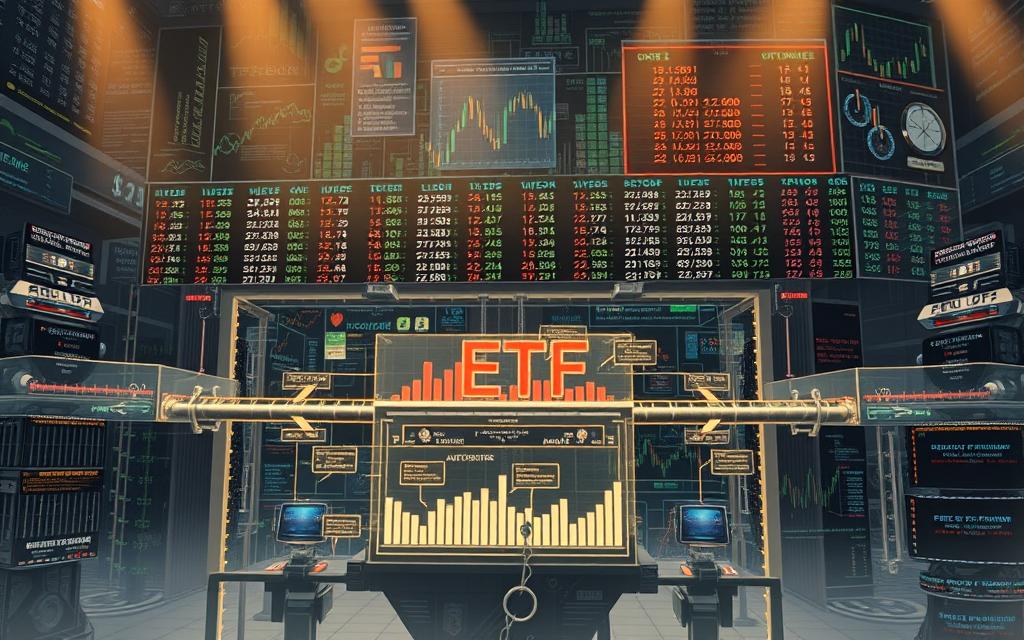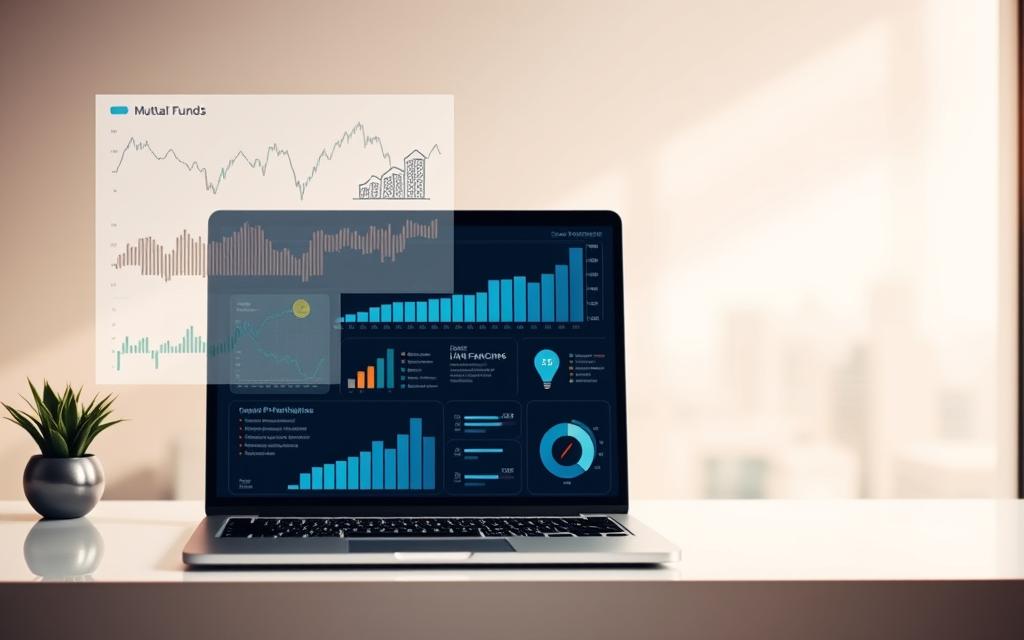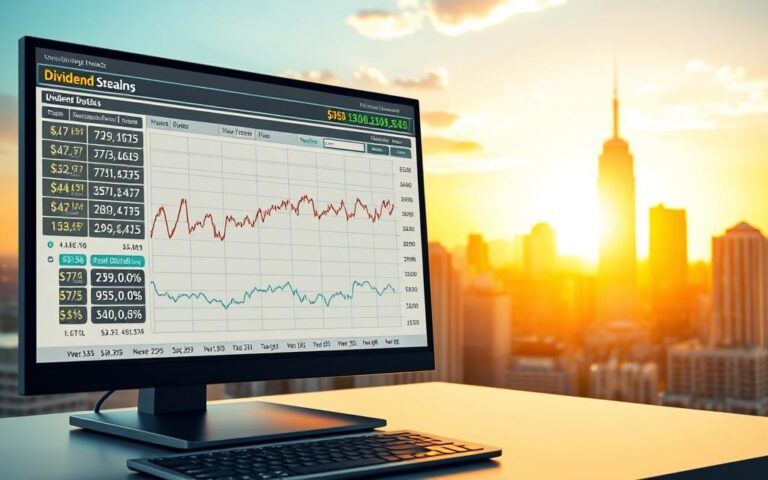Advertisement
As of 2023, over 7,000 mutual funds and more than 2,500 ETFs manage trillions in assets. This shows how key it is to know the differences between these investment options. With investors wanting more diversity and passive investing, comparing ETFs and mutual funds is crucial. This guide will highlight their benefits and risks to help you make the right choices for your financial goals.
Understanding ETFs: Basics and Features
ETFs have become popular among investors who want diversity and flexibility in their investments. They offer unique advantages over common investment options. This makes them an attractive choice for both beginners and seasoned investors.
Definition of ETFs
An ETF contains a mix of assets like stocks or bonds. It can be traded on an exchange, similar to individual stocks. This means ETFs are designed to be bought and sold easily during the trading day. Investors like the simplicity of trading ETFs just as they would individual stocks.
Structure of ETFs
ETFs have a structure that many find appealing. For instance, they often aim to track the performance of a market index. So, an ETF can mimic the returns of a market benchmark. This provides a simple method for investors to gain access to different sectors without picking specific stocks.
Trading Mechanism of ETFs
The way ETFs are traded sets them apart. They allow for trading in real-time with fluctuating prices throughout the day. This lets investors quickly react to market shifts. It ensures they can jump on opportunities to buy or sell, similar to individual stock trading.

Exploring Mutual Funds: Basics and Features
For investors wanting to grow their money, understanding mutual funds is key. These funds let you invest in lots of assets like stocks or bonds with the help of experts. We will look at what mutual funds are, their different kinds, and how they are managed.
Definition of Mutual Funds
Mutual funds gather money from a lot of people to buy a wide mix of securities. They are great because you get experts managing your investments. These managers work hard to meet the financial goals of the fund.
Types of Mutual Funds
There are many kinds of mutual funds, each designed for specific investment needs and risks. Let’s see some examples:
- Actively Managed Funds: Experts pick stocks or bonds to try and beat the market.
- Index Funds: These funds try to match a market index by owning similar securities.
- Bond Funds: They focus on debt like government or company bonds.
- Equity Funds: Investing in stocks, these funds may aim for growth, value, or focus on a sector.
How Mutual Funds are Managed
Professionals manage mutual funds by studying the market and selecting securities. They decide where to invest the fund’s money to reach its goals. Through ongoing monitoring, they keep the fund aligned with its objectives.

Key Differences Between ETFs and Mutual Funds
It’s important to know the big differences between ETFs and mutual funds for smart investing. Each kind of investment has special traits that suit different goals and likes.
Trading Flexibility
ETFs let you trade with more freedom than mutual funds. You can buy and sell ETFs all day at current market prices. This means you can react quickly to how the market is doing. You can also use different types of orders, like limit and stop orders.
In contrast, mutual funds only get their price set at the end of the day. This makes immediate trading impossible.
Expense Ratios and Fees
ETFs usually cost less in fees than mutual funds that are actively managed. This makes ETFs a cheaper option for a lot of investors. Mutual funds often have higher fees because they have costs for managing and running them.
ETFs can be a more wallet-friendly choice, helping you save on costs. This can really help grow your investments over the years.
Tax Efficiency
ETFs and mutual funds also differ in how they’re taxed. ETFs usually don’t give out as much in capital gains. This means they can be more tax-efficient for investors.
This is good news for anyone wanting to keep their taxes low while investing.
Costs Associated with ETFs and Mutual Funds
When you think about investing in ETFs and mutual funds, understanding the costs is key. You’ll need to look at management fees, commissions, and load fees. These costs affect your returns, so knowing about them helps in making smart investment choices.
Management Fees
Management fees are a big part of the costs for ETFs and mutual funds. Generally, ETFs have lower management fees because they are passively managed. This means they cost less to operate. Over time, saving on these fees can add up, making ETFs a budget-friendly choice for investors.
Commission and Transaction Costs
Commissions and transaction costs differ a lot between ETFs and mutual funds. Many mutual funds don’t charge commissions, which is great for people who invest for a long time. On the other hand, trading ETFs can involve commission fees depending on where you trade. Knowing these costs is crucial to find the cheapest way to invest.
Impact of Load Fees and Expenses
Load fees are extra charges to consider with mutual funds. These fees can really affect your returns, especially in funds that are actively managed. Mutual funds have different rules about load fees, like front-end or back-end charges. It’s important to see how these fees could change the amount you make, to ensure you’re investing wisely.
| Cost Type | ETFs | Mutual Funds |
|---|---|---|
| Management Fees | Typically lower | Usually higher |
| Commissions | May apply based on trading platform | Often commission-free |
| Load Fees | No load fees | Can vary (front-end or back-end) |
Performance Comparison: ETFs vs Mutual Funds
Investors often look at how ETFs and mutual funds have done in the past. They want to understand what to expect from these investments in different market conditions. Looking into how much they go up and down helps investors see the risks. By doing this, they can figure out which investment is better for their goals.
Historical Returns
ETFs usually try to match the performance of certain indexes, which makes their returns more predictable. On the other hand, mutual funds aim to do better than the indexes, and their returns can vary a lot. This is because it depends on the manager’s choices. Studies show that most mutual funds don’t often beat the indexes over a long time.
Volatility Analysis
The ups and downs in investments can show us how the market is behaving. ETFs tend to be less bumpy than mutual funds because they are passively managed. Mutual funds often switch investments, which can make them more unstable. It’s important for investors to understand this to handle their portfolio’s ups and downs better.
Risk Assessment
Looking closely at the risks of ETFs and mutual funds can help investors plan better. Both can make a portfolio less risky while offering a mix of different investments. By comparing their risks, investors can choose the one that fits their goals and how much risk they’re okay with.
Liquidity Considerations in ETFs and Mutual Funds
Liquidity is key when picking between ETFs and mutual funds. Knowing their trading hours and market liquidity is vital. It really affects how investors make decisions and shape their strategies.
Trading Hours and Market Liquidity
ETFs offer trading flexibility similar to stocks. Investors can trade shares all day. This makes the market more liquid, allowing for quicker deals. It can also lead to better prices because of live market changes. Investors can instantly respond to news or market shifts. This makes ETFs a great choice if you want fast access to your money.
Redemption Process for Mutual Funds
Mutual funds, on the other hand, have set trading times. You can only sell shares at the end of the day. This affects how easily you can get to your money. With mutual funds, you might wait until the business day ends to trade. It may also delay getting your money after selling. This can make mutual funds less appealing than ETFs, which offer quick trades.
Tax Implications of ETFs and Mutual Funds
Many investors don’t think about tax implications when choosing where to put their money. Knowing about these can lead to smarter choices, especially with capital gains and dividends. ETFs and mutual funds handle taxes differently, affecting your final gains.
Capital Gains Distributions
ETFs often have lower capital gains than mutual funds. Their structure lets people buy and sell without making others pay more taxes. Mutual funds, however, can make everyone pay taxes when they sell stocks within the fund.
Tax Treatments on Dividends
Dividends from investments can also affect your taxes. Usually, they’re taxed like regular income, unless they’re special “qualified dividends.” ETFs usually give out dividends less often than mutual funds. This might help you with tax planning and lower what you owe.
Accessibility for Investors
It’s important for any potential investor to understand how accessible ETFs and mutual funds are. Both offer ways to grow your wealth, but their investment requirements and investor eligibility can be quite different.
Minimum Investment Requirements
ETFs are usually more accessible because they need less money to start. You can buy ETF shares at the price of one share, which might be just a few dollars for some funds. This makes it easier for more people to invest without needing a lot of money at first. On the other hand, mutual funds often ask for $1,000 or more to start investing.
Investor Eligibility and Restrictions
Investor eligibility can be tricky, depending on what you choose to invest in. While both ETFs and mutual funds are open to many, some mutual funds have rules about who can invest, based on things like how much money you make or your investing skill. This could stop some people from investing. ETFs are usually less restrictive, so almost anyone can buy shares through a brokerage account.
How to Choose Between ETFs and Mutual Funds
Choosing between ETFs and mutual funds depends on what you want and need. Important factors include your investment goals, how long you plan to invest, your comfort with risk, and how much cost matters to you.
Assessing Investment Goals
Knowing what you aim to achieve with your investments is key. Your goals might be to grow your money, earn income, or keep your savings safe. Depending on these goals, you might prefer ETFs for their variety and lower costs, or mutual funds for their steady income and expert management.
Considering Time Horizon and Risk Tolerance
Your investment timeframe affects your choice. Short-term and long-term goals require different strategies. Your willingness to take risks is also important. If you’re okay with more risk for the chance of higher returns, ETFs might be appealing. But if you prefer playing it safe, mutual funds with their expert managers could be better.
Evaluating Cost Efficiency
How much it costs to invest matters too. ETFs tend to be cheaper, which can help your earnings grow over time. Mutual funds might have higher fees, but they come with professional managers who actively make decisions. Weighing these costs against what you hope to achieve financially will help you decide between ETFs and mutual funds.
Strategies for Investing in ETFs and Mutual Funds
Investing in ETFs and mutual funds needs careful planning and strategy. There are several strategies to boost returns and manage risks. Dollar-cost averaging and professional management are key for investors.
Dollar-Cost Averaging
Dollar-cost averaging means investing a set amount regularly. This way, you buy more shares when prices are low and fewer when they’re high. It lessens the impact of market swings and supports long-term investing without market timing worries.
Utilizing Professional Management
For a hands-off approach, professional management in mutual funds is great. These funds are run by pros who track market trends, pick assets, and adjust as needed. It’s perfect for those without the time or skills for personal investing, ensuring experts handle your money.
Conclusion: Making an Informed Decision
The choice between ETFs and mutual funds depends on what you want from your investment. Both options have their own benefits and challenges. Knowing these differences helps you choose wisely.
ETFs are great if you like to trade often and want lower costs. Mutual funds, with their expert management, are good for those looking for stability over the long haul.
Final Thoughts on ETFs vs Mutual Funds
Your decision should match your investment goals and how much risk you can handle. It’s crucial to look at things like how easy it is to buy or sell, costs, and how taxes will affect you. This way, your choice will support your financial plans.
Understanding the pros and cons of ETFs and mutual funds is key. That helps ensure your investment method fits your style.
Recommendations for Different Investor Profiles
If you’re young and can handle risk, ETFs might be right for you. They’re easy to trade and tend to have lower fees. On the flip side, mutual funds might be better for those closer to retirement or who prefer regular earnings. These funds often aim for steady gains rather than big risks.
Choosing investments that match your needs is crucial. It sets you up for a better chance at success in the long run.



